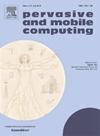Delay-aware resource allocation for partial computation offloading in mobile edge cloud computing
IF 3.5
3区 计算机科学
Q2 COMPUTER SCIENCE, INFORMATION SYSTEMS
引用次数: 0
Abstract
Mobile Edge Cloud Computing (MECC), as a promising partial computing offloading solution, has provided new possibilities for compute-intensive and delay-sensitive mobile applications, which can simultaneously leverage edge computing and cloud services. However, designing resource allocation strategies for MECC faces an extremely challenging problem of simultaneously satisfying the end-to-end latency requirements and minimum resource allocation of multiple mobile applications. To address this issue, we comprehensively consider the randomness of computing request arrivals, service time, and dynamic computing resources. We model the MECC network as a two-level tandem queue consisting of two sequential computing processing queues, each with multiple servers. We apply a deep reinforcement learning algorithm called Deep Deterministic Policy Gradient (DDPG) to learn the computing speed adjustment strategy for the tandem queue. This strategy ensures the end-to-end latency requirements of multiple mobile applications while preventing overuse of the total computing resources of edge servers and cloud servers. Numerous simulation experiments demonstrate that our approach is significantly superior to other methods in dynamic network environments.
移动边缘云计算中部分计算卸载的延迟感知资源分配
移动边缘云计算(MECC)作为一种前景广阔的部分计算卸载解决方案,为计算密集型和延迟敏感型移动应用提供了新的可能性,这些应用可以同时利用边缘计算和云服务。然而,为 MECC 设计资源分配策略面临着一个极具挑战性的问题,即同时满足端到端延迟要求和多个移动应用的最小资源分配。为了解决这个问题,我们全面考虑了计算请求到达的随机性、服务时间和动态计算资源。我们将 MECC 网络建模为一个两级串联队列,由两个顺序计算处理队列组成,每个队列有多个服务器。我们采用一种名为深度确定性策略梯度(DDPG)的深度强化学习算法来学习串联队列的计算速度调整策略。该策略既能确保多个移动应用的端到端延迟要求,又能防止过度使用边缘服务器和云服务器的总计算资源。大量模拟实验证明,在动态网络环境中,我们的方法明显优于其他方法。
本文章由计算机程序翻译,如有差异,请以英文原文为准。
求助全文
约1分钟内获得全文
求助全文
来源期刊

Pervasive and Mobile Computing
COMPUTER SCIENCE, INFORMATION SYSTEMS-TELECOMMUNICATIONS
CiteScore
7.70
自引率
2.30%
发文量
80
审稿时长
68 days
期刊介绍:
As envisioned by Mark Weiser as early as 1991, pervasive computing systems and services have truly become integral parts of our daily lives. Tremendous developments in a multitude of technologies ranging from personalized and embedded smart devices (e.g., smartphones, sensors, wearables, IoTs, etc.) to ubiquitous connectivity, via a variety of wireless mobile communications and cognitive networking infrastructures, to advanced computing techniques (including edge, fog and cloud) and user-friendly middleware services and platforms have significantly contributed to the unprecedented advances in pervasive and mobile computing. Cutting-edge applications and paradigms have evolved, such as cyber-physical systems and smart environments (e.g., smart city, smart energy, smart transportation, smart healthcare, etc.) that also involve human in the loop through social interactions and participatory and/or mobile crowd sensing, for example. The goal of pervasive computing systems is to improve human experience and quality of life, without explicit awareness of the underlying communications and computing technologies.
The Pervasive and Mobile Computing Journal (PMC) is a high-impact, peer-reviewed technical journal that publishes high-quality scientific articles spanning theory and practice, and covering all aspects of pervasive and mobile computing and systems.
 求助内容:
求助内容: 应助结果提醒方式:
应助结果提醒方式:


